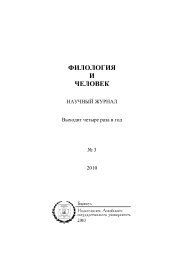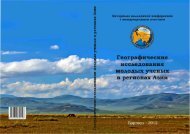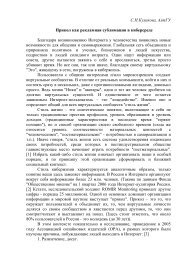Erasmus Mundus Action 1 Compendium 2009 - EACEA - Europa
Erasmus Mundus Action 1 Compendium 2009 - EACEA - Europa
Erasmus Mundus Action 1 Compendium 2009 - EACEA - Europa
You also want an ePaper? Increase the reach of your titles
YUMPU automatically turns print PDFs into web optimized ePapers that Google loves.
<strong>Erasmus</strong> <strong>Mundus</strong> Masters Courses<br />
Duration: 1 year 8 months<br />
IMFSE<br />
International Master of Science in Fire Safety Engineering<br />
Course description:<br />
The joint programme (EMMC) in Fire Safety Engineering (FSE) establishes a top-level education in<br />
Fire Safety Engineering. Students completing the EMMC will be qualified for technical or scientific jobs<br />
in the field of FSE and will have a network of contacts in the field.<br />
Currently, the application of fire safety codes and design procedures is evolving from a prescriptive<br />
towards a performance-based approach. This evolution is accompanied with an equally drastic<br />
transformation of the educational framework and an increase in the number of needed professionals in<br />
Fire Safety Engineering.<br />
The three partners (Ghent University, Lund University and University of Edinburgh) build upon their<br />
excellence in research and experience with existing educational programmes in FSE to deliver this<br />
new EMMC. Each partner has their own expertise. Ghent specializes in the behaviour and modelling<br />
of fire and explosions ('general FSE'). Lund is a recognized leader in human behaviour in fires, fire<br />
modelling and risk analysis. Edinburgh is the developer of the first curriculum in structural fire safety<br />
engineering, with a focus on infrastructure.<br />
The duration of the program is 2 years (120 ECTS credits). The language of instruction is English.<br />
The students spend semester 1 and 3 in either Ghent or Edinburgh. All students spend semester 2 in<br />
Lund. The fourth term covers the master's thesis, for which one of the three partners will be<br />
responsible, although the work can be done in another institute (if appropriate).<br />
All of the involved higher education institutes already provide education in Fire Safety Engineering,<br />
each with a world wide reputation of exellence. The partners will deliver a joint degree ('International<br />
Master of Science in Fire Safety Engineering', called 'Master (Two Years) of Science in Fire Safety<br />
Technology' at Lund University*.<br />
Applicants should have a Bachelor degree or recognized equivalent from an accredited institution<br />
(minimum 3 years full-time study or 180 ECTS credits) in civil engineering, structural engineering,<br />
mechanical engineering, material sciences, chemical engineering, chemistry, physics, applied physics,<br />
or a related discipline. Other criteria that will be taken into account are awards, TOEFL scores,<br />
external references and details of earlier project work.<br />
*The name 'Fire Safety Engineering' cannot be used in Sweden because it is protected according to<br />
Swedish Higher Education Ordinance; this has no practical implications and the diploma is a true joint<br />
degree, issued by the three universities).<br />
Website: www.imfse.ugent.be<br />
Partners:<br />
GHENT UNIVERSITY, Belgium (Co-ordinating institution)<br />
UNIVERSITY OF EDINBURGH, United Kingdom<br />
LUND UNIVERSITY, Sweden<br />
Contact:<br />
Bart Merci<br />
DEPARTMENT OF FLOW, HEAT AND COMBUSTION MECHANICS<br />
Sint-Pietersnieuwstraat 41<br />
9000 GHENT - Belgium<br />
Bart.Merci@ugent.be<br />
80






